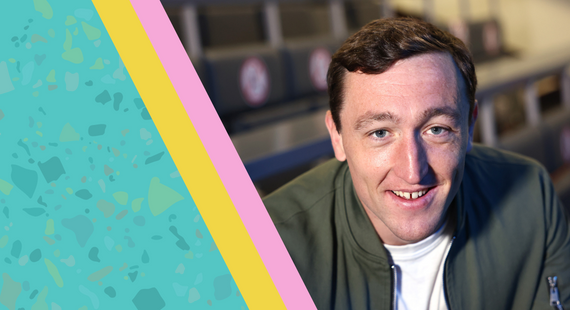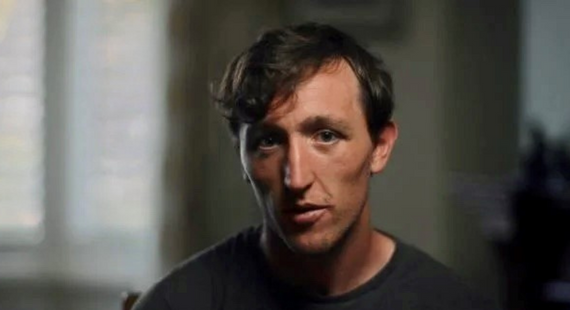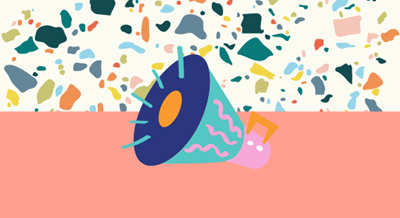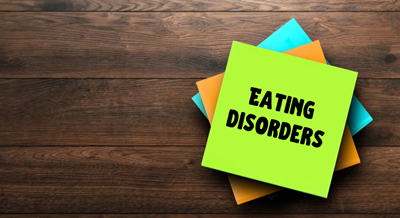
Cormac Ryan reflects on his experience of recovery from an eating disorder and shares his message of hope for others.
Everyone has different ways of processing and getting through difficult periods in life. Despite not having a musical bone in my body, music and the lyrics within it are of great comfort to me in times of struggle. Let me tell you about that struggle.
"Waitin' on a train that just won't come
The rain, it ain't permanent
And soon, we'll be dancin' in the sun"
Dermot Kennedy, Better Days
It’s 28 June 2021. I wake, feeling like my life is crumbling around me, terrified about what lies ahead for the day. I leave the house on the verge of tears: nine years of bearing this cross has finally broken me. An hour later, I’m reluctantly knocking on the door of Lois Bridges, an eating disorder treatment centre in North Dublin.
It’s my first day of treatment. I’m the 28-year-old, six-foot two-inch GAA player. I’m not meant to have an eating disorder. I’m not meant to be in treatment. I’m not meant to struggle to eat. I’m not meant to care about my body image.
But I do have an eating disorder. I am in treatment. I do struggle to eat. I am obsessed with what I look like. And I’ve finally cracked.
I’m no longer functioning. I’m not living; I’m simply existing. I’m willing to try to get better, but I’m convinced there is no hope. The night had become my life, and it felt like forever. I was sure the rain was permanent. I never believed it possible that, so soon, I’d be “dancin’ in the sun”.
I’m not going to try and explain eating disorders or attempt to simplify the complexity of the condition, because I can’t. If I’m being honest, I’m not able to. 18 months on from my diagnosis, I’m still learning every single day. Some days I understand; some days I’m completely confused.
I’m not going to try and give advice on what way to approach recovery or how to support a loved one, because I’m not qualified to do so. But what I can do is offer a real-life example of hope and someone who is lucky enough to be coming out the other side.
If you’re reading this and you’re in the thick of it, I want you to know that I’ve been there. I’ve been afraid to let go too but there is a way out. There is a path back to a happy and fulfilling life.
Knowing when to seek help
Isolation and confusion. For me, they were the two worst parts.
Isolation: thinking I was the only man in this world with an eating disorder. Why? Because that is what we’re led to believe: “men don’t get eating disorders”.
Confusion: convincing myself I was going insane. “Why can’t I stop looking in the mirror?”. “Why can’t I just eat?”. “I can’t tell anyone because they’ll think I’m insane.”
The isolation and confusion brought with them a torment that was, in many ways, worse and more distressing than the eating disorder itself. I genuinely believed that I was resigned to a life of distress and torment. And I feared that, eventually, the distress and torment would take me past the point of no return.
“Please swallow your pride
If I have things you need to borrow
For no one can fill
Those of your needs that you won't show"
Bill Withers, Lean on Me
If I have one regret of the years that have passed, it’s that I didn’t swallow my pride and ask for help sooner. Eating disorders are inherently secretive conditions. We do our best to hide our struggle, to protect our eating disorder. I wish that I had the courage to acknowledge my pain, but I didn’t show my struggle and, therefore, no one could possibly have filled my needs.
If I knew then what I know now, I’d have danced into Lois Bridges on 28 June, safe in the knowledge that it was the first day of a new life.
That is the message that I want to portray in these words: that there is a new life awaiting you if you choose to let go. A life you probably don’t think is possible anymore.
Getting treatment for an eating disorder
So, what was treatment like? Initially, treatment was a scary and daunting prospect. I’d be lying if I said I wasn’t dreading it.
I had no idea what to expect. I feared that I’d be witnessing distress around every corner, forced feeding, or have no one who could relate to me. However, within 24 hours, Lois Bridges became my safe, supported space, one that I hated leaving: a therapeutic approach that completely takes the focus off the food; supported mealtimes; staff who genuinely cared; and people who just got ‘it’. What I viewed as my most irrational thoughts were things which my peers all experienced too. And I’m so lucky to say that amongst them were three very special people who have become dear friends for life.
In short, treatment was a fulfilling, cathartic, and educational experience. Of course, there were days when the tears didn’t stop. The pain of why I hated myself so much had to be explored. We had to dig through the despair, grief, and trauma to get to the source of the eating disorder, but, with each passing day, there was growth and healing.
It’s a very rare gift to be able to take eight weeks of your life to do nothing but examine every fibre of your being. I learned why I hated myself. I soon began to like myself again. I explored my values and pondered what I really care about in life.
I now do my best to live each day by them and that’s brought with it a clarity on what I want from life.
Understanding my eating disorder
How come I’m not I talking more about the food? Why am I not explaining how they taught me to eat again?
Because it’s not about the food. It never was about the food. It never will be about the food.
It was about me, my sense of self, my self-worth. As a wise friend once said, it’s about how you see yourself in the world.
“Fixing up a car to drive in it again
When you're in pain
When you think you've had enough
Don't ever give up”
Coldplay, Up and Up
Finding the way back
Fast forward a year to 28 June 2022, I’m sitting in on a park bench in New York city, sipping on a milkshake. Just 43 days ago, I left the Golden Gate Bridge in San Francisco on a bicycle. I’ve just lived out a lifelong dream of cycling across America. A solo, self-supported 6,228-kilometer journey across deserts and mountains, raising over €35,000 for Bodywhys.
A year previous, I couldn’t bear to be left with my own thoughts for more than a few hours. I’ve just spent six weeks traversing the United States, sitting with my thoughts all day, every day through the vast countryside.
A year previous, I could only eat one meal a day. Now, I’m showing respect to my body, fuelling it as it needs to be, and it’s repaid me in a way I could never have imagined.
My life has flipped on its head. A quality of life has returned. The distress and torment are things of the past. I’m not perfect or “fully recovered”, but my relationship with food is in a place I never envisaged possible.
More than anything, I’m content with who I am again. I’ve a love for life again. I find myself smiling like I used to and dreaming of all the exciting possibilities that now lie ahead.
As far away as you may feel from this, I promise you that you’re closer than you think. No matter the pain, even when you think you’ve had enough, don’t ever give up. There’s always a way back.
As I sit on that park bench in New York, I ponder how my life has changed so much in just 12 months. The milkshake tastes sweet. My mind is at peace. My future feels bright. My demeanour may appear pensive, and even somewhat sombre as I sit overlooking the Hudson River, but in my head and in my heart, I’m dancing in the sun.

Cormac Ryan is a 29 year old physiotherapist from Dublin. He is a former Dublin GAA minor and Under 21 hurler, now turned endurance cyclist. In late 2021, he featured in Unspoken, an RTÉ documentary which followed Cormac through his eating disorder treatment and recovery journey. In recent years, he has undertaken several charity endurance challenges.
In 2021, Cormac cycled over 5,000 kilometres across Europe, from Achill to Athens. In June 2022, Cormac cycled 6,000 kilometres solo across the United States from San Francisco to New York, with the aim of raising awareness of eating disorders. In total, Cormac has raised over €150,000 for various charities.
The views and opinions expressed here are the author’s own.
Find out more
Continue to…
Living with schizophrenia


